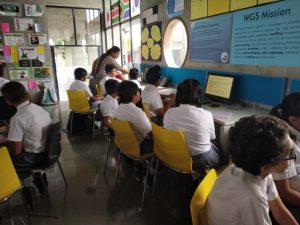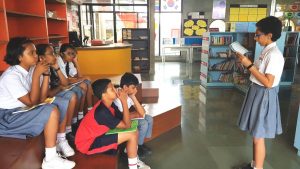International Mindedness
When I heard this word the first time, I was a bit confused. I was running short of words to explain it. Now also, I cannot say that there is a proper definition of International mindedness. Every person or every individual has their understanding of it.
International mindedness appreciates the uniqueness, listening to others, respecting the differences, opinions, and perspectives, understanding different cultures, learning multiple languages, and respecting each other.
Being a Librarian of all three programs, I always try to teach the students the importance of international-mindedness through stories, read-aloud sessions, celebrating different festivals, national & international language day, and many more activities. We guide the students for their better future, become better citizens, overcome new difficulties, and face life challenges. Our students should comprehend different cultures and individuals and respect and recognize divergent points of view. According to the programs and their levels, we implement International mindedness across the school in different ways.
What we do in PYP – PYP centers around six transdisciplinary themes “who we are, where we are in place and time, how we express ourselves, how the world works, how we organize ourselves and sharing the planet”(Jamal 22). I collaborate with the teachers regularly to know about the UOI and LOI (Unit of Inquiry and Lines of Inquiry)and plan my lessons accordingly. Then, through the medium of stories, make connections to the UOI & the LOI, so the students get the understanding of the topics through the different and exciting ways and focus on promoting the same simultaneously with incorporating the culture, languages, festivals with the help of images, puppets, read aloud, videos, etc.
While reflecting on the stories and having group discussions on them, students listen very carefully to each other’s reflections. They give importance to the opinions provided by their classmates. When it comes to providing feedback to fellow students, they take it positively and implement it too. This way, they understand and implement the International mindedness through their learning practice.

What we do in MYP & DP – In MYP and DP(Middle Year Programme and Diploma Programme students), the thinking, applying, and understanding level of any topic or concepts are quite different, so we connect and teach international mindedness with the global contexts in our teaching. Global contexts are extraordinary to IB because the interdisciplinary themes adopted worldwide to assist students in considering them to be global citizens and understand that the world is interconnected in so many ways. We select the topics related to global issues, development on global levels, moral rights, multicultural, worldwide celebrations, and many more for our sessions, debates, general discussion, quizzes for the students, and connect them to one of the global contexts every time.

The outcome of the same is measured with their participation and their reflections. They show so much interest and do the pre-search collaboratively, respect each other’s perspective and opinion to deliver their best during these sessions, and better understand international-mindedness. If we talk about DP, it is not the same as other school preliminary programs since it looks beyond the knowledge needed to breeze through tests. DP focuses on interconnecting the understanding that is concerned with the education of the students and their learning. The plan of action that DP uses to implement this methodology is by underlining core areas as the Extended Essay ( EE ), Theory of Knowledge (TOK), and Creativity, Action, and Service (CAS) within the program. One of my favourite core areas is TOK. It urges students to be learners in everyday circumstances and challenges them to discover relationships among academics and their thoughts, imagination, emotions, and actions. We ensure and plan the sessions accordingly to assist students with creating international-mindedness in them.

We try to develop the activities in such a way for all the programs. Students can become truly internationally-minded as they are the world’s future and represent themselves as global citizens. They required flexibility, tolerance, and respect toward all cultures and involvement in different cultural locations. I am sure they all can make this world better and better in so many ways.
Work Cited List:
Jamal, Sameena. “From Theory to Practice: A Critical Review of the International Baccalaureate Primary Years Programme.” The International Schools Journal, vol. 35, no. 2, John Catt Educational Limited, Apr. 2016, p. 22.
By Deepa Chhetri
Wockhardt Global School, Aurangabad
School Website: https://wockhardtglobalschool.com/

